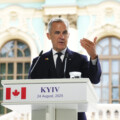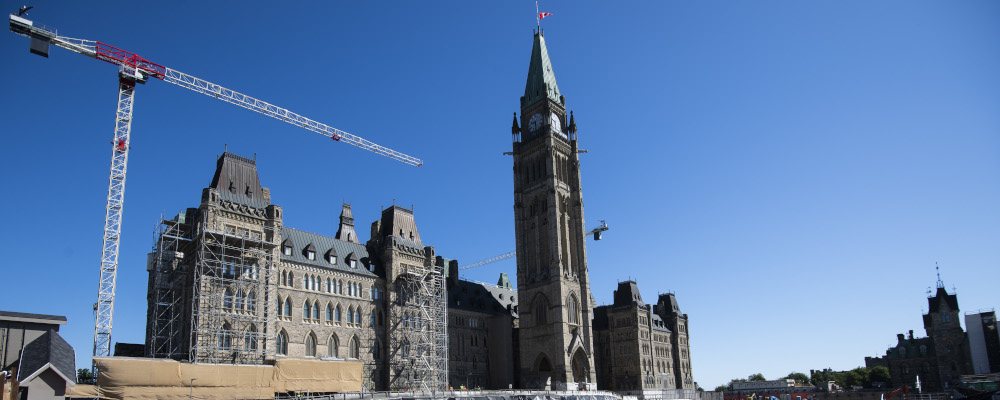If one was in search of the perfect symbol of our collective inability to build anything in modern Canada, they wouldn’t need to look any further. Recent news that the restoration of Parliament’s Centre Block will now cost as much as $5 billion and take until 2030 to complete is nearly a bit too on the nose.
The project’s massive costs and lengthy construction timelines reflect the institutional and policy sclerosis that’s beset public and private projects across the country. That it involves the building that’s home to our federal elected officials is a powerful metaphor for the broader problems with building in Canada.
Policymakers have so enveloped the country in a labyrinth of rules, regulations, and red tape that they themselves can no longer escape the consequences. If it wasn’t such a massive taxpayer expense, it would almost be fitting punishment for their poor choices.
The evidence is quite overwhelming: Canada ranks 34th of 35 OECD countries for the length of time to obtain general construction permits. It takes, on average, 250 days to get a permit in Canada, which is three times (168 days) longer than in the United States. We now find ourselves in the odd company of the Slovak Republic and other former communist states when it comes to the efficiency and expectedness of our regulatory processes. This isn’t generally a good sign.
It has direct consequences in the form of high costs and project delays. The Centre Block project is notable because of its extraordinary costs but it’s hardly an outlier. Building projects in Canada are regularly among the slowest and most costly around the world. As The Hub’s contributor Chris Spoke pointed out in late April, for instance, Canadian costs on transit infrastructure (typically measured as cost per kilometre) can be as much as four or five times as high as in better-performing jurisdictions.
These costs aren’t merely borne by investors and taxpayers either. They spill into the broader economy and ultimately affect individuals and households.
Our slow and costly construction processes reflect a comfort with modern society’s stagnation.
Take housing for instance. A late 2020 report by C.D. Howe Institute scholar Ben Dachis estimated that the supply-constraining results of a combination of government regulations, taxes, and fees add an average of $230,000 to home prices across the country’s eight most heavily-regulated cities. Vancouver’s housing regulation costs, by the way, are by far the largest in Canada, resulting in an extra cost of $644,000 for the average new house.
But our inability to build doesn’t just contribute to direct financial costs. It also has indirect effects on our culture and society. It’s contributed to a deeper malaise — a “crisis of confidence” as Conservative MP Michael Chong recently characterized it in an interview with The Hub.
Our slow and costly construction processes reflect a comfort with modern society’s stagnation and sclerosis. It’s as if we’ve resigned ourselves to the idea that high costs and project delays are just the natural order of things. The result is a self-reinforcing cycle whereby our collective complacency breeds further costs and delays and they in turn lead to greater resignation and even less urgency. In this sense, the Centre Block project represents both a cause and effect of what New York Times columnist Ross Douthat describes as an “age of decadence.”
If the problem is inertia, how do we get out of it? How do we restore the idea that different and better is possible? How do we start building again?
Public policy is a big part of the puzzle. We need to deconstruct and rebuild regulatory processes for housing, transit, child-care spaces, long-term care homes, energy infrastructure, industrial construction, and various other parts of Canadian life currently mired by red tape, endless consultations and multiple project approvals.
Such a regulatory reform agenda cannot just be another “weed-whacking” exercise to eliminate superfluous or outdated regulations. It must be more ambitious. The goal should be to reconceptualize our regulatory systems with the intent of tilting them more in the direction of building.
But as important as public policy is, there’s the deeper and more complicated issue of will and desire. The political system will only respond if the Canadian public demands it — if voters no longer accept that it should take more than five years to install an elevator in a Toronto subway station or cost $8 million to construct and manage an outdoor hockey rink on Parliament Hill or require another $30 billion to replace our aging naval ships. Canadians, in short, need to want to rebuild a national commitment to building.
One wonders if the pandemic experience may contribute to such a renewed vision. A combination of rising housing prices, the lack of vaccine production capacity, government procurement delays, a deep economic recession, and growing concerns about our reliance on China for critical goods may ultimately be a catalyst for greater urgency and a sense of purpose. Perhaps it will be enough to jolt us from the complacency and resignation that’s been holding us back and bring an end to Douthatian decadence.
If so, the restored Centre Block building (whenever it’s eventually completed) may stand as a physical reminder of a key turning point in modern history: when Canadian society overcame its crisis of confidence and started building again.
Recommended for You

The Weekly Wrap: Is the Poilievre comeback real?

Stephen Staley: The culture war comes for Cracker Barrel

Rudyard Griffiths and Sean Speer: Canada’s bad GDP numbers come with big risks for the Carney government

Tim Sargent: Ontario’s economy is in trouble. Here’s how to fix it




